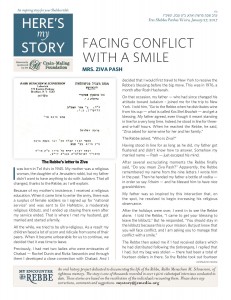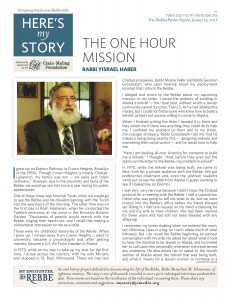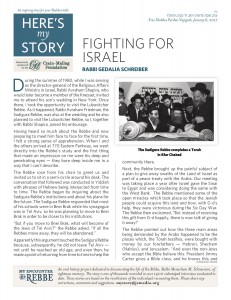Facing Conflict With a Smile
I was born in Tel Aviv in 1945. My mother was a religious woman, the daughter of a Jerusalem rabbi, but my father didn’t want to have anything to do with Judaism. That all changed, thanks to the Rebbe, as I will explain.
Because of my mother’s insistence, I received a religious education. When it came time to enter the army, there was a surplus of female soldiers so I signed up for “national service” and was sent to Ein HaNatziv, a moderately religious kibbutz, and I ended up staying there even after my service ended. That is where I met my husband, got married and started a family.
All the while, we tried to be ultra-religious. As a result my children faced a lot of scorn and ridicule from their peers. When it became unbearable for us to continue, we decided that it was time to leave.
Previously, I had met two ladies who were emissaries of Chabad – Rochel Dunin and Rivka Sassonkin and through them I developed a close connection with Chabad. And I decided that I would first travel to New York to receive the Rebbe’s blessing before the big move. This was in 1976, a month after Rosh Hashanah.
On that occasion, my father – who had since changed his attitude toward Judaism – joined me for the trip to New York. I told him, “Go to the Rebbe when he distributes wine from his cup – what is called Kos Shel Bracha – and get a blessing. My father agreed, even though it meant standing in line for a very long time. Indeed, he stood in line for three-and-a-half hours. When he reached the Rebbe, he said, “Ziva asked for some wine for her and her family.”
The Rebbe asked, “Who is Ziva?”
Having stood in line for as long as he did, my father got flustered and didn’t know how to answer. Somehow my married name – Pash – just escaped his mind.
After several excruciating moments the Rebbe finally said, “Do you mean Ziva Pash?” Apparently, the Rebbe remembered my name from the nine letters I wrote him in the past. Then he handed my father a bottle of vodka – in order so say l’chaim – and he blessed him to have nice grandchildren. (more…)







